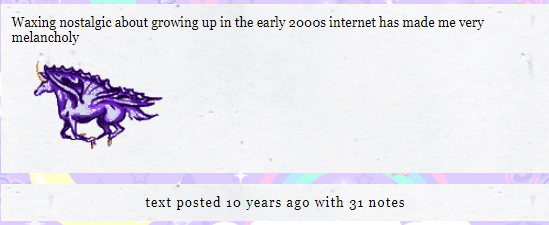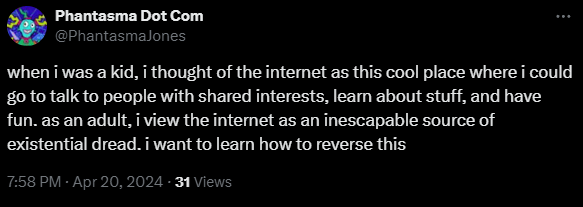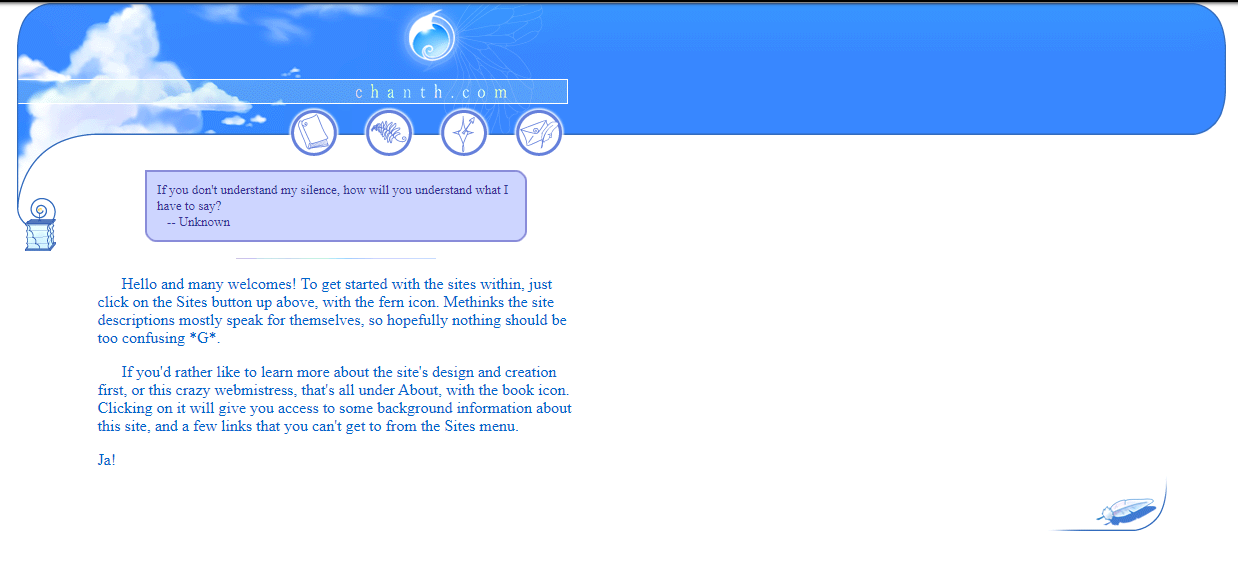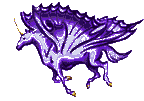manifesto
wow, a manifesto. lol. i never thought i'd be writing one of these, but here i am. it makes me feel a little like a serial killer or something. i promise i'm not a serial killer!! i am just a millennial who had an Angelfire website when i was 11 years old. when i first discovered Neocities in early 2024, i was moved to tears. i know it sounds stupid, but when i was browsing everyone's pages, seeing the revival of the lost art of the Personal Website, it was literally like finding a piece of my childhood again. lately, i've been focusing a lot on healing my inner child, & connecting with that part of myself.
recently i took a dive into my old tumblr from when i was in my early 20s. it was... enlightening. what i found super interesting was this post, where i was feeling nostalgic for the "Yesterweb" a decade ago:

that gif i used in the screenshot above, the purple unicorn with wings, was one i used to use on my old websites as a kid. an internet friend of mine had unearthed a ton of old 90s/early 00s geocities gifs, & we found all our old favorites & i guess that's what inspired our little nostalgia moment in 2014.
i'd been struggling since 2019 or so to try to find the words as to why the Internet wasn't as fun for me as it used to be, & part of the reason, i knew, was the shift from a "decentralized" web where people had their own websites & a couple of "blogging" platforms like livejournal/xanga/what-have-you, vs. the Internet we know now, which is very "centralized" to me. pretty much everyone is one the same few social media platforms owned by corporations. i don't even remember how i found Neocities, but i'm already late to the game, it seems. it looks like lots of people came here in 2020, which makes sense. i've read a lot of manifestos & a bit of the "Yesterweb" stuff, & i find myself agreeing with people so much. it's taken me a while to really find the words what i want to say.
i think this tweet i Twote back in April is a good starting point:

when i was a kid, i spent a lot of time on the Internet. i basically grew up on it. there's a good chance you're like me, or you know someone like me. someone who had a rough childhood, socially withdrawn, had more friends online than IRL. yeah, that was me in the 2000s. there were a lot of us. and a lot of us had websites. personal websites were something beautiful & unique, an everyday person's way of carving out their digital identity before myspace, before facebook, before tumblr & twitter, before youtube & tiktok.
something weird happened to me in late april 2024. i was getting over my first bout of COVID, & i had really bad brain fog. this unfortunately coincided with my first finals week of grad school. i went a lil crazy, & started making these weird, almost avant garde shitposts on twitter, which was the main form of social media i'd been using at the time. i started thinking a lot about social media, & how there seemed to be a general attitude that sincerity was CRINGE & that if you weren't this like, mean, detached sarcastic hater online, you were CRINGE. i started reading about "irony poisoning." yes, i did all of these things when i should have been working on my finals, because i have ADHD. anyway, this was around the same time i discovered NeoCities. i knew i wanted eventually to create a website & write a manifesto, but i didn't have the time/emotional bandwidth. so i made a Carrd instead, & made my first attempt at a manifesto, which was focused more on the concept of "cringe." you can read that here.
i recently found a cached version of a personal website i used to go on all the time, Chanth. i started weeping quietly as it loaded before my eyes. (one thing you are gonna learn about me is that i cry a lot.) i hadn't thought of this website in probably over a decade, & i have no idea why it suddenly flitted back into my mind. i think i used to go on this website in 2003 or something like that. the site's abandoned, but thank god for the Internet Archive.

there's something so beautifully earnest about this webpage, with none of the self-conscious affectations we typically see in social media bios now.
i've been thinking about the internet a lot lately. i've mostly been thinking about social media & how unfullling it is, & how concerned & frustrated i am with how i see people behave on it. i've been thinking a lot about how the Internet used to be a Place i would go to, in the computer den, like i'd hear the dialup noise & everything. & then eventually i would Log Off & disconect & i would be Offline. i am Always Online now. i am actively trying to be Less Online. & i know it may seem paradoxical, but making this website is a step toward me becoming Less Online.
i've been thinking about how i think social media poisons our minds, & how it rewards ragebait & perpetual outrage, how so many people there think in weird & unhealthy ways, the groupthink, the mis- & dis-information. (are those the same thing? idk.) i've been thinking about how difficult it is to criticize people on Da Left of any of those types of behavior without being labeled as a bigot. i'm thinking about how social media seems more like a tool to shame & judge people than an outlet for genuine connection & expression. i've been thinking about how i feel like we dehumanize each other on social media, & increasingly extreme & antisocial views & behavior are being promoted as desirable & healthy.
i've been thinking about how i've started doing some honest to goodness Research into my feelings about social media, & how a lot of what i've been struggling to express the last few years about the current state of social media has weight. i've started reading The Chaos Machine: The Inside Story of How Social Media Rewired Our Minds and Our World by max fisher. i know the title sounds pretty corny but it's good so far.
i have a hard time trying to say what i wanna say sometimes... anyway... i spent a lot of time exploring peoples' websites on & off Neocities, & reading their Manifestos. here are links to some of my favorites, including quotes from each one that i think are particularly insightful or revealing.
Lu's manifesto
FAV QUOTE: But it would be lonely sitting out there by itself, an antique oddity in a sea of tumbling faces twittering about. I had no idea there were others keeping this tradition alive until I stumbled upon NeoCities, and I knew it would be the perfect home for my site. NeoCities, for those who don't know, is a FREE web-hosting community. It's users are cool creatives, reclaiming the internet for the people. (If you're sick of being constrained to social media and want to BE FREE TO BE YOURSELF, check them out! You can create a site on any server, but this one is free. Also HTML is pretty easy to get the hang of.)
Sadgrl's manifesto (i can't recommend this Manifesto enough)
FAV QUOTE: In order to discuss social relations online, it's impossible to ignore social media. Originally, I felt that social media was pure toxicity and there was no benefit at all from being a part of it. It exploits us by selling our data and bombarding us with ads, and is full of trolls. At the same time, it's where the people are. It's how many people keep in touch with their friends, and leaving social media would be even more alienating than continuing to use it. We shouldn't shame others for using social media. As long as people continue to use it, we should advocate for learning to use those platforms in different, healthier and more humanizing ways. For example, we could do this by placing less effort on 'liking' posts and more effort on responding to them with an intention to make a real connection with its author. The default goal on social media is to amass followers and likes, rather than to make meaningful connections with other people, and that's something we can counter by changing our behavior.
Bechnokid's manifesto
FAV QUOTE: The site will not encourage getting rid of social media. For better or worse, social media allows others to communicate and form bonds just like they would outside the web. In fact, social media was how I met my wife and husband. Instead, this site will advocate for better ways of using these platforms, such as taking the time to respond to posts instead of just "liking" them.
Simon's manifesto
FAV QUOTE: I had tumblr, but never posted on it, my art not fitting into the communities that appeared active (fan art, pixel art, furry art, etc), and finding that any topic i had interest speaking in, was full of mean spirited people who had the worst faith assumtions. Discussion based internet communities tend to feature that, and a mindest of proving oneself right and morally supperior, rather than reaching an understanding together. twitter is even worse than tumblr, not even having the funny reblog chains, and only having enough text to make witty (insufferable) one liners. and of course now elon musk is the ceo
Rain's manifesto
FAV QUOTE: In some ways like that, having a cleaner web is nice; it’s easy to find and keep in contact with friends, it’s easier to babyproof things, and easier to find big communities. Unfortunately, that comes with corporate baggage. Babyproofing websites takes away freedom. Hyper-connectivity is a hotbed for stealing our personal information. And despite technology becoming more widespread, many people don’t know how phones or computers work, because it’s in corporations’ best interests to make computers black boxes. That way, we’re entirely dependent on them to fix our stuff when it breaks. The centralised web is part of this – we’re dependent on facebook, on twitter, on discord. You are, I am too. So instead of completely rejecting the web as it is today, I think a better approach is to explore having some more control for yourself.
Avery's manifesto
FAV QUOTE: It can't be mere nostalgia alone.Half this stuff was already old by the time I started using the Internet. So what was I really drawn to? "I love ugly websites," I used to declare proudly. But, more than questionable design choices, what I love about the Geocities era was the creative freedom that it represented. Old stories about the Internet describe it as "the Wild West," an unmoderated land of limitless possibility - and danger. But in 2020, that no longer feels true. Most web traffic seems to go to a handful of social media sites. Due to "minimalist" UI, the All-Mighty Algorithm, and a need to remain advertiser-friendly, social media offers very little in the way of tools for creative expression, and buries unique or interesting posts under low-effort "content" by "influencers" or celebrities that garners a lot of "engagements" and eyeballs to sell ads to.
L-chan's manifesto
FAV QUOTE: Yet despite all this, the Internet was fun. There were separate websites for kids, teens, and adults. (Just try finding a genuine just-for-kids or just-for-teens website nowadays. Everyone's expected to share the same handful of websites.) You could read all kinds of interesting opinions, play games, or look at pictures of a strangers' pets. If you saw something you didn't like, you just typed a new URL into the address bar and went somewhere that you knew you did like. More importantly: Big Business and social media did not monopolize everyone's attention. There were no algorithms steering you towards upsetting political topics or trying to sell you stuff. Nobody was tracking your web-surfing habits to sell to the highest bidder. Conversations were on small forums of a few hundred people, not on behemoths like Twitter and Facebook. People could be anonymous and use silly usernames without anyone acting like we had something sinister to hide.
The "Old" Web: What Have We Lost?
FAV QUOTE: As you can see, the old web focused more on individuals and individuality, whereas the new web is less individual and much more commercial. While I'm in no way discounting the value of sites like Twitter and Tumblr (especially the latter as it allows at least some amount of customisation in terms of user pages), the Web 1.0 style allows much more space for someone to make their online presence exactly how they want it.
So, why a personal website?
FAV QUOTE: Of course, I'm not saying the internet was a perfect halcyon era back then, not at all. But it really felt like self-expression was worth something. There was this air of fun and exploration about the World Wide Web. The mainstream internet I see today is a completely different beast. A huge chunk of the web of today has been taken up by six or so websites owned by megacorporations, in which users like you and I are definitely not the priority. The only importance users have is in regards to their personal data (which gets collected to be used and often sold) and how much time they spend on the site and thus how many ads they see. Users are valued only by how much profit they can bring to the corporations that own these sites. Individual self-expression has no place here, it gets suffocated by algorithms that work in increasingly bizarre ways and forces the users (many of which get commodified into the title of “content creator”) to go out of their way and try their best to please the fickle computer gods. Do it correctly, and your work gets flung into the endless stream of content in other users’ feeds to be seen for a few seconds before they move on. Do it wrong, and your work gets thrown into the void without even being given the chance of being seen.
Why the Internet Isn’t Fun Anymore (the new yorker)
FAV QUOTE: Remember having fun online? It meant stumbling onto a Web site you’d never imagined existed, receiving a meme you hadn’t already seen regurgitated a dozen times, and maybe even playing a little video game in your browser. These experiences don’t seem as readily available now as they were a decade ago. In large part, this is because a handful of giant social networks have taken over the open space of the Internet, centralizing and homogenizing our experiences through their own opaque and shifting content-sorting systems. [...] The Internet today feels emptier, like an echoing hallway, even as it is filled with more content than ever. It also feels less casually informative. Twitter in its heyday was a source of real-time information, the first place to catch wind of developments that only later were reported in the press. Blog posts and TV news channels aggregated tweets to demonstrate prevailing cultural trends or debates. Today, they do the same with TikTok posts—see the many local-news reports of dangerous and possibly fake “TikTok trends”—but the TikTok feed actively dampens news and political content, in part because its parent company is beholden to the Chinese government’s censorship policies.
Whatever Happened to Profile Customization? by randy moon (Youtube)
